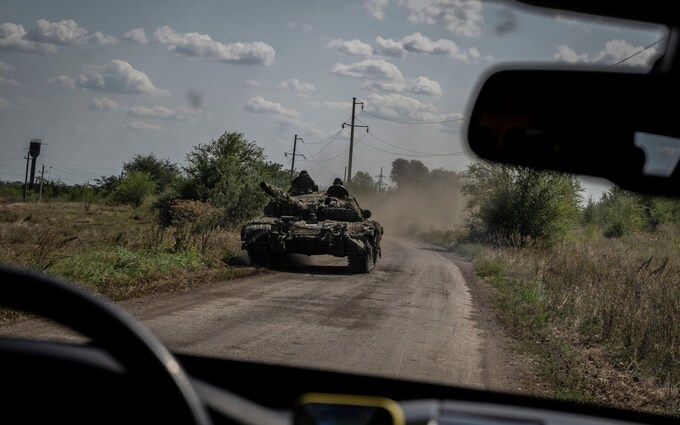
Ukraine: The Latest - Ukraine advances as Russia reduced to 50pc combat power
Every weekday The Telegraph's top journalists analyse the Russian invasion of Ukraine from all angles and tell you what you need to know

Today on Ukraine: The Latest, we analyse updates from the front lines, bring you the latest diplomatic news around the world and discuss how Ukraine is getting tough on medical exemptions from military duty.
Dom Nicholls, Associate Editor for Defence, starts by explaining the latest analysis on the Ukrainian counter-offensive.
It’s very difficult to accurately plot Russian defensive belts, where they start, where they stop, and how to account for all the other positions that are covering those fortifications. As I’ve said many times, all defences should be covered by view and fire surveillance assets and preferably humans and fire.
We think Ukraine is through the first obstacle belt. I was in a briefing earlier today with Western officials and the consensus is that Ukraine has broken through that first obstacle belt. The Western official described the fighting there as a PhD in land warfare to give an idea of what we’re asking, what is expected of Ukraine’s forces to go from having no real credible combined arms capability to having a go at one of the hardest land operations possible.
Dom continues by charting the decline of Russian combat power.
The Western official was saying Russia is thought to be now at 50% of the combat power it had in February last year. That’s the land combat power, obviously.
Navy, Air Force, much lower than 50% of combat power. That’s not a bad return of investment, especially when you’re talking to political leaders about how much they should support the war with money and equipment. Not a bad return on investment for Ukraine doing all the fighting.
As Ukraine advances on the southern front, Francis Dearnley, The Telegraph’s Assistant Comment Editor, gives us details of an important strategic development, the visit of the US Secretary of State to Kyiv.
Mr. Blinken’s two day trip marks the first to Kyiv by a top US official since the Ukrainian counter offensive began. He will meet with President Zelensky and Foreign Minister Kuleba among with other senior officials as well as civil society figures later today.
The Secretary of State is also expected to announce a new package of U. S. assistance worth more than 1 billion dollars, a senior State Department official has told reporters, though we don’t yet know the details of that. I imagine we’ll hear that tomorrow or on Friday.
As is so often the case, several hours before the arrival, Russia carried out airstrikes on Kyiv and the southern region of Odesa.
No casualties were reported in the capital, but a civilian was killed and port infrastructure was damaged in the south. Russia targets those places where major officials will be visiting to drum home this point that the war is far from over and Russia is still capable.
Listen to Ukraine: the Latest, The Telegraph’s daily podcast, using the audio player at the top of this article or on Apple Podcasts, Spotify, or your favourite podcast app.
War in Ukraine is reshaping our world. Every weekday The Telegraph’s top journalists analyse the invasion from all angles - military, humanitarian, political, economic, historical - and tell you what you need to know to stay updated.
With over 40 million downloads, our Ukraine: The Latest podcast is your go-to source for all the latest analysis, live reaction and correspondents reporting on the ground. We have been broadcasting ever since the full-scale invasion began.
Ukraine: The Latest’s regular contributors are:
David Knowles
David is Head of Audio Development at The Telegraph, where he has worked for nearly three years. He has reported from across Ukraine during the full-scale invasion.
Dominic Nicholls
Dom is Associate Editor (Defence) at The Telegraph, having joined in 2018. He previously served for 23 years in the British Army, in tank and helicopter units. He had operational deployments in Iraq, Afghanistan and Northern Ireland.
Francis Dearnley
Francis is assistant comment editor at The Telegraph. Prior to working as a journalist, he was chief of staff to the Chair of the Prime Minister’s Policy Board at the Houses of Parliament in London. He studied History at Cambridge University and on the podcast explores how the past shines a light on the latest diplomatic, political, and strategic developments.
They are also regularly joined by The Telegraph’s foreign correspondents around the world, including Joe Barnes (Brussels), Sophia Yan (China), Nataliya Vasilyeva (Russia), Roland Oliphant (Senior Reporter) and Colin Freeman (Reporter). In London, Venetia Rainey (Weekend Foreign Editor), Katie O’Neill (Assistant Foreign Editor), and Verity Bowman (News Reporter) also frequently appear to offer updates.